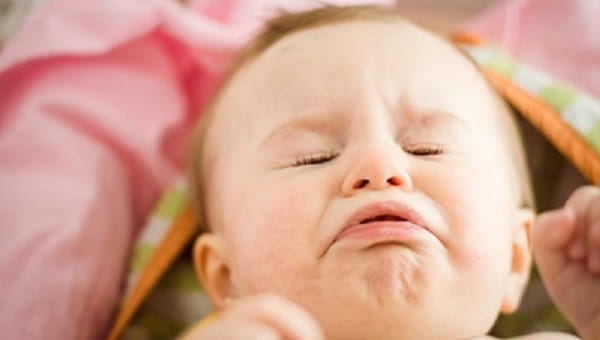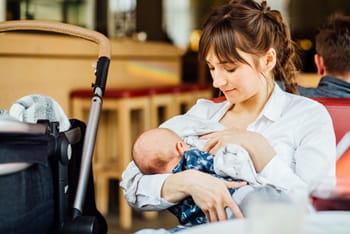If your normally happy baby is cranky with the sniffles and an upset stomach, it might be more than just a cold. It could be allergies. It’s not always easy to tell whether your baby has a cold or an allergic reaction because the symptoms may seem similar, according to Parents magazine, which offers a guide to some symptoms in various parts of your newborn’s body:
- Eyes: Allergies and viruses can cause conjunctivitis, or pink eye. Its symptoms include a red eye and a discharge that can make your baby’s eye crusty in the morning. If he has allergies, he might rub his eyes more often, but you should consult your baby’s doctor to confirm if he has a virus or allergies.
- Skin: While rashes are common in infants, the rashes typically fade when they’re around 2 or 3 months old, which is when allergic rashes may develop. Atopic dermatitis, or eczema, is the most common type of allergic rash. Another type is contact dermatitis, which a baby gets when he has a reaction to irritants like detergent, poison ivy, wool clothes or soap.
- Upper respiratory tract: If your newborn has cloudy mucus dripping from his nose and a fever, he likely has a cold, and these symptoms should fade in about a week. However, he might have allergies if he has “persistent, thin, watery nasal discharge” for more than a week, and you should contact her doctor. If your baby has a severe allergic reaction, known as anaphylaxis, that causes swelling of his airways and prevents him from breathing, call 911.
- Lower respiratory tract: It’s common for infants and toddlers to cough and wheeze – even more so when they have a respiratory virus and their airways get swollen, or they have asthma. Babies with allergies are vulnerable to respiratory viruses. Consult your baby’s doctor if he has persistent coughing and wheezing.
- Stomach: If your baby has a virus, he could have diarrhea, vomiting, gassiness or an upset stomach. But food may not be the only cause of these symptoms. It could be environmental allergies.
The March of Dimes notes that your child might have allergies to certain foods and that the most common symptoms are skin reactions. They also might be at risk of developing asthma or eczema. The organization recommends that parents keep their kids away from foods they’re allergic to, and it says nearly all food allergies are caused by eggs, peanuts, cow's milk, wheat, soy, fish, shellfish and nuts from trees.
Talk with your pediatrician about ways to soothe your newborn’s symptoms if he has allergies. They could include oral antihistamines, such as Benadryl (for an older baby), and skin moisturizers or 1 percent hydrocortisone cream for eczema and other types of allergic rashes.
It might be helpful to reduce your baby’s exposure to allergens in your home in the following ways:
- Not permitting anyone to smoke in the house
- No carpeting in your baby’s room
- Cleaning regularly to minimize dust and mold
- Using pillowcases and mattress covers that are dust mite-proof
- Keeping your house free of pets
Talk to your baby's doctor for more information about allergies.


